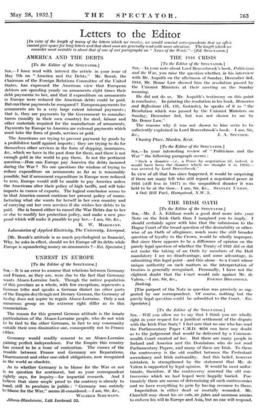Letters to the Editor
[In view of the length of many of the letters which we receive, we would remind correspondents that we often cannot give space for long letters and that short ones are generally read with snore attention. The length which we consider most suitable is about that of one of our paragraphs on •• News of the Week."—[Ed. Seger.vrort.]
AMERICA AND THE DEBTS
[To the Editor of the SPECTATOR.]
have read with interest the article in your issue of May 7th on " America and the Debts." Mr. Borah, the Chairman of the Foreign Relations Committee of the United States, has expressed the American view that European debtors are spending yearly on armaments eight times their debt payments to her, and that if expenditure on armaments in Europe were reduced the American debts could be paid. But can these payments be compared ? European payments for armaments are to a very large extent internal payments ; that is, they are payments by the Government to manufac- turers (usually in their own country) for steel, labour and other materials required for the manufacture of armaments. Payments by Europe to America are external payments which must take the form of goods, services or gold.
The Americans are trying to prevent payment by goods by a prohibitive tariff against imports ; they are trying to do for themselves other services in the form of shipping, insurances, &c., which we have in the past done for them, and there is not enough gold in the world to pay them. Is not the pertinent question—How can Europe pay America the debts incurred during the War ? No one questions the wisdom of trying to reduce expenditure on armaments as far as is reasonably possible, but if armament expenditure in Europe were reduced to zero, Europe would still be unable to pay America unless the Americans alter their policy of high tariffs, and will take imports in excess of exports. The logical conclusion seems to be that America cannot continue her present policy of manu- facturing what she wants for herself in her own country and of carrying out her own services if she wishes her debts to be paid. She is bound either to cancel the War Debts due to her or else to modify her protection policy, and make a new pro- posal which will make it possible to pay her.—I am, Sir, &c., E. W. MARCILiNT. Laboratories of Applied Electricity, The University, Liverpool.
[Mr. Borah's attitude is as much psychological as financial. Why, he asks in effect, should we let Europe off its debts while Europe is squandering money on armaments P—En. Spectator.]








































 Previous page
Previous page